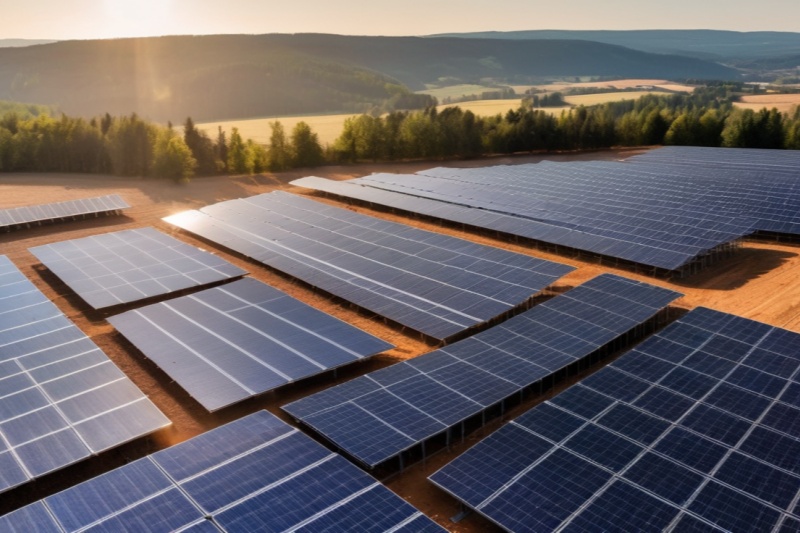Sun, Soil, and Security: Precautions for Ground-Mounted Solar Installations
Solar photovoltaic (PV) systems are a fantastic way to harness the sun's power and generate clean, renewable energy. However, if you're considering a ground-mounted solar system, careful planning and precautions for installing solar photovoltaic systems on the type of ground are crucial for a safe, efficient, and long-lasting system. This blog post will delve into the key factors to consider when installing solar panels on the ground, ensuring your investment performs optimally for years to come.

1. Evaluating Your Land for Ground-Mounted Solar Power Systems
Soil Type and Stability: The type of soil on your property significantly impacts the installation process and the support structure required for ground mounted solar photovoltaic systems. Solid, well-drained soils like compacted gravel or clay are ideal. Sandy soils, loose fill, or areas prone to erosion may require additional foundation work or alternative mounting solutions. A geotechnical survey can assess your soil composition and bearing capacity to ensure it can support the weight of the system.
Slope and Sun Exposure: For optimal energy production, your solar panels should face south and receive direct sunlight throughout the day. Steep slopes might require adjustments to the solar pv ground mount systems or may not be suitable for ground-mounted installations altogether. Consider consulting with a solar professional to determine the ideal placement for your panels to maximize sunlight exposure.
2. Understanding Local Regulations and Permits for Ground Mounted Solar
Building Codes and Setbacks: Ground mounted solar power systems may be subject to specific building codes and setback requirements in your area. These regulations may dictate the minimum distance your panels must be placed from property lines, structures, and roadways. Always check with your local building department to ensure your planned installation complies with all regulations.
Environmental Considerations: Depending on your location, there might be environmental regulations to consider for ground mounted solar systems. These could pertain to potential wildlife habitat disruption or historical preservation concerns. Consulting with local authorities can ensure your project adheres to all necessary environmental guidelines.
3. Ground-Mounted System Design and Stability:
Structural Engineering: The design of your ground-mounted system depends on various factors, including the size and weight of your solar panels, the wind and snow load in your region, and the soil conditions. A qualified structural engineer can design a safe and reliable ground mount solar system that withstands the elements and ensures the long-term stability of your solar array.
Foundation and Ballasting: Depending on the soil type and system design, the foundation for your ground-mounted system could involve concrete piers, screw piles, or ground anchors. Alternatively, in some cases, ballasting may be an option. This involves using heavy rocks or concrete blocks to weigh down the mounting system, eliminating the need for deep foundations in stable, well-drained soil. A qualified ground mount solar company can advise on the most suitable foundation approach for your specific needs.
4. Safety and Security Considerations for Ground Mounted Solar Systems
Electrical Safety: Ground-mounted solar systems require proper grounding to prevent electrical hazards. A qualified electrician should install the system according to electrical safety codes to ensure safe operation and maintenance.
Physical Security: Ground-mounted systems are more susceptible to vandalism or theft compared to rooftop installations. Consider fencing your solar array or installing security cameras to deter potential issues. Additionally, some insurance companies may offer specific coverage plans for solar systems. Discussing your security concerns with your insurance provider can ensure your investment is adequately protected.
Planning for a Successful Ground-Mounted Solar Project
By carefully considering the precautions for installing solar photovoltaic systems on the type of ground outlined above, you can ensure your ground-mounted solar installation is safe, efficient, and complies with all regulations. Consulting with qualified professionals, such as geotechnical engineers, structural engineers, and experienced ground mount solar companies, is crucial for a successful and long-lasting solar project.
Ready to Harness the Power of the Ground-Mounted Sun?
Do you have any questions about ground-mounted solar installations, precautions for installing solar photovoltaic systems on the type of ground, or the process of planning and installing your own ground mounted solar photovoltaic systems project? Leave a comment below, and we'll be happy to help you navigate the path towards solar power!

